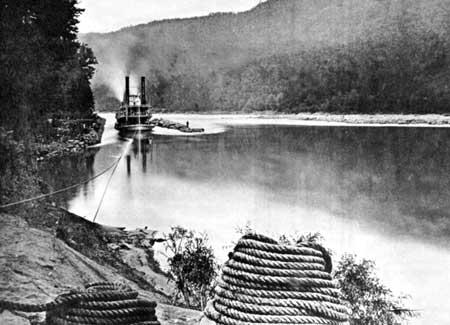|
CHICKAMAUGA and CHATTANOOGA National Military Park |
 |

Steamboat with supplies for Union Army being warped up narrows of
Tennessee River between Bridgeport, Ala. and Chattanooga.
Courtesy National Archives.
Relief of Knoxville
Meanwhile, in East Tennessee, Burnside attempted to hold Longstreet in check by abandoning territory and skirmishing when necessary, but avoiding any serious fight. This took Longstreet farther away from Chattanooga and lessened his opportunity to assist Bragg. Burnside gained precious time by using these tactics. Grant's plan was to "whip" Bragg and then help Burnside.
After Missionary Ridge, with Bragg in full retreat, Thomas prepared to send Granger's Corps and detachments from other commands, about 20,000 men altogether, toward Knoxville. In addition, Sherman was to march along the Hiwassee River to protect Granger's flank. Grant reports that upon "Returning from the front on the 28th, I found that Granger had not yet got off . . . I therefore determined . . . to send him [Sherman] with his command, and orders . . . were sent him at Calhoun to assume command of the troops with Granger, in addition to those with him, and proceed, with all possible dispatch, to the relief of Burnside."
Skirmishing was more or less continuous around Knoxville. Burnside followed the original plan of buying time by giving up ground and fell back toward Knoxville, withdrawing into the city during the night of November 16—17. Longstreet drew up before the city the next day, and on the 29th made his initial attack against the Union position at Fort Sanders. The assault was repulsed and before it could be renewed Longstreet received word of Bragg's defeat on Missionary Ridge. The Confederate commander deemed it necessary to maintain a threatening position before Knoxville until the approaching Union relief columns were but a day's march distant. On December 4, Longstreet began his retreat toward Virginia. Sherman arrived on the 6th, and preparations for the pursuit of Longstreet were soon under way. Burnside's command moved out in pursuit of Longstreet's force; Granger's Corps became the garrison of Knoxville; and Sherman's command returned to Chattanooga.

|

|
|
Last Modified: Fri, May 17 2002 10:00:00 pm PDT |


